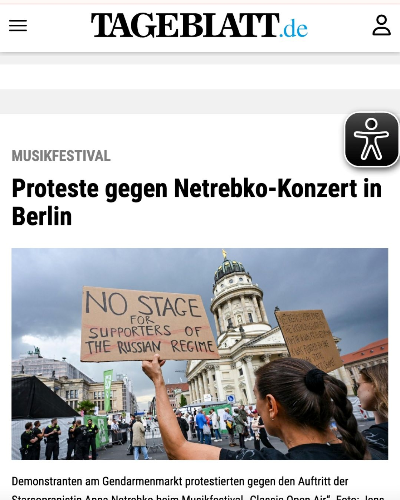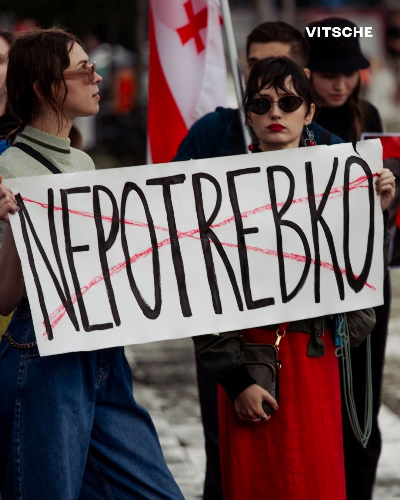
© Facebook Vitsche Berlin
У Берліні близько 200 українських і грузинських активістів провели демонстрацію перед історичним майданом Гендарменмаркт у центрі Берліна. Вони протестували проти концерту оперної співачки Анни Нетребко, відомої своїми зв’язками з владою Кремля, в рамках фестивалю Classic Open Air. Організаторами виступили українська платформа Vitsche та грузинська організація GZA. Учасники тримали українські прапори та плакати з гаслами: «Росія — терористична держава!», «Ніякої сцени для прихильників Путіна!» та «Ні — культурній пропаганді». Організатори привезли на акцію українську швидку, яка постраждала внаслідок обстрілів — цей посил мав нагадати про реальні наслідки війни та підкреслити політичний контекст виступів артистки. Основна критика Нетребко полягає у тому, що, хоча вона декларувала засудження війни, ніколи відкрито не засудила Путіна й не відмовилася від підтримки російського режиму. У 2014 році вона позувала з прапором «Новоросії» та передавала мільйон рублів театру у прифронтовому Донецьку, що викликало зустрічний осуд і звинувачення у культурній солідарності з окупантом. Elisabeth Sonotka, художня керівниця Берлінської опери, заявила, що не вважає Нетребко «козлом відпущення» і підтвердила намір запросити її на сезон 2025–26. Однак вона визнала, що ситуація залишається складною й викликає суперечки в культурних колах. Попри протести, виступ Анни Нетребко відбувся за планом і з великим аншлагом — усі квитки були продані задовго до концертів, а критики відзначили її артистичну майстерність, хоча й не змогли ігнорувати тло протестів. Активісти оголосили, що мають намір продовжувати кампанії проти виступів артистів з явною проросійською позицією у європейських культурних інституціях.
No to the Opera of War: Berlin Responds to Putin Ally Netrebko with Protest
Around 200 Ukrainian and Georgian activists gathered for a protest in front of the historic Gendarmenmarkt square in central Berlin. The demonstration targeted a concert by Russian soprano Anna Netrebko, known for her longstanding ties to the Kremlin, held as part of the Classic Open Air festival. The event was organised by the Ukrainian civil platform Vitsche and Georgian activist group GZA. Protesters waved Ukrainian flags and held signs reading: “Russia is a terrorist state,” “No stage for Putin’s friends,” and “Stop cultural propaganda.” To underscore the devastating consequences of Russia’s war against Ukraine, organisers brought to the square a Ukrainian ambulance damaged in shelling, turning it into a stark visual statement. The aim, they said, was to confront concertgoers and the public with the human cost of the war and to highlight the political implications of hosting artists linked to the Russian regime. Netrebko has faced international criticism for her ambiguous stance on the war. While she has issued statements against the invasion, she has never explicitly condemned Vladimir Putin nor distanced herself from her earlier support for the Russian state. In 2014, she was photographed holding the flag of “Novorossiya” — a symbol of the Kremlin-backed separatist movement — and reportedly donated one million rubles to a theatre in occupied Donetsk. These actions prompted widespread accusations of cultural complicity with the Russian occupation. Elisabeth Sonntags, Artistic Director of the Berlin State Opera, defended the soprano, saying she should not be made a scapegoat and confirmed plans to invite Netrebko back for the 2025–26 season. However, she admitted that the situation remains sensitive and controversial in artistic circles. Despite the protests, Netrebko’s concert proceeded as scheduled and sold out completely. Critics praised her vocal performance, but many acknowledged the event was overshadowed by the growing backlash and the symbolic weight of the protests outside. Activists vowed to continue pressuring European cultural institutions to ban performers who align themselves with Russia’s imperialist policies, insisting that artistic platforms should not be neutral in the face of aggression and authoritarianism.

©
1772